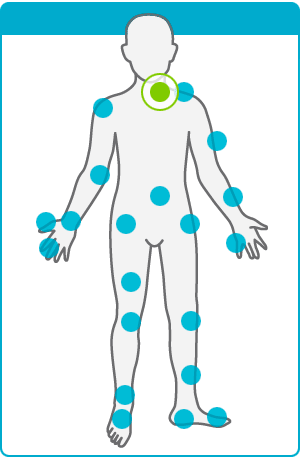[one_half last=”no”]
 |
[/one_half]Injuries to the neck can range from a simple soft tissue sprain which causes temporary pain and stiffness, to a fracture or dislocation of the spine with irreversible damage to the spinal cord. The part of the spine that courses through the neck is known as the cervical spine.
Neck Injuries most commonly involve a sudden movement of the neck. This may be as a result of a voluntary rotation of the neck by the individual and with a sharp shooting pain, sometimes extending to the back of the head. This usually settles quite quickly.
Whiplash is a similar quick movement of the neck as a result of the body or head being jolted. Typically this occurs in a car accident where the individual is hit from behind and the neck is momentarily hyper-extended. The muscles then go in to spasm to prevent movement of the injured neck. If there is any suspicion of instability or fracture, the neck with the rest of the spine must be immobilised, seen by a doctor and investigated appropriately. Once instability of the neck has been excluded, it is important to treat the neck pain by:
- Initial ice pack application (15 mins on, 15 mins off)
- Keeping the neck warm in the days after the injury
- Taking a short course of anti-inflammatories and analgesia
- Starting early rehabilitation exercises.
Neck Pain is a very common problem, mostly as a result of muscle fatigue from over-use. This is particularly evident after sitting at a computer for too long. A strain can occur after sleeping in an awkward position or in conjunction with tense fatigued muscles. In individuals with low back pain and poor posture, sometimes neck pain will also occur- the lower spine becomes slowly flexed forward over time and in order to stand or see straight ahead, the neck is extended backwards to compensate resulting in overuse and pain.
Arthritis is very common in the lower part of the cervical spine but does not always cause symptoms. Similarly disc degeneration in the lower cervical spine is very common but not necessarily likely to cause symptoms. However, one can experience neck pain, arm pain and weakness in the limbs depending on how severe the arthritis or disc degeneration is. Injury to an arthritic neck is more likely to cause damage to the nerves or spinal cord than in a non-arthritic neck and should be evaluated properly by a doctor.